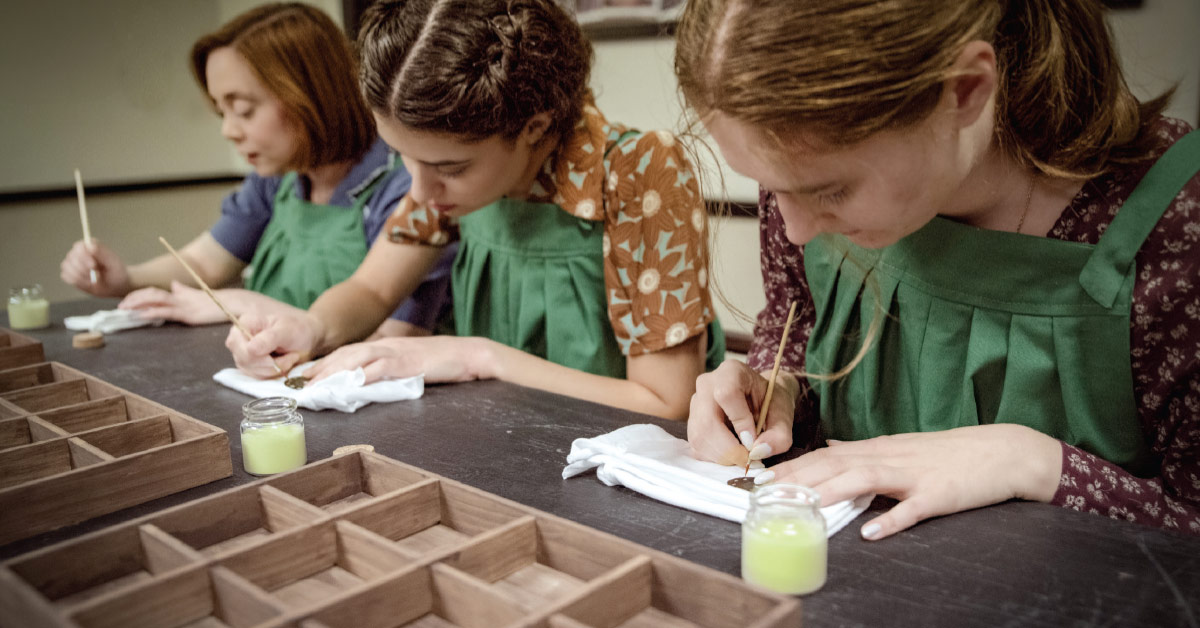If you didn’t know better, the name Radium Girls might conjure up visions of something light-hearted: a team of superheroes, maybe, with radioactive capes, or a line of glowing Rockettes.
The far weightier truth is that it refers to women who, in the early 20th century, suffered and, sometimes, died while performing work they were assured was perfectly safe.
D.W. Gregory’s play, Radium Girls, onstage at Kalamazoo’s The Civic November 8th through November 17th, takes as its inspiration Grace Fryer, a real-life woman who began painting watch dials for U.S. Radium at the age of 18. The painting was bioluminescent; at times, to keep a sharp point on their brushes, the women would touch the tips of them to their lips, unaware of the dangers they were subjecting their bodies to. How Fryer discovered just how dangerous radium was, and what she did about it, constitutes some but not all of the play.
Dr. Miriam Thomas, the play’s director, mentioned the show’s complexity. “We have a talented cast of seventeen actors taking on thirty-eight distinct roles, the majority of which are based on real people who played a part in this history. The play is comprised primarily of short scenes that, taken together, tell a complex and comprehensive story.” The show is fast-paced, transitioning often between times and locations, demonstrating the vice-like grip yesterday can have on today as well as the strength of will required to pull free of it.
Yesterday! It can be difficult if not impossible to remember what a miracle radium seemed at the time. Not only could it give you a watch that could glow in the dark–a novelty for most of us, but a godsend for some, including soldiers–it could cure blindness, reduce muscle pain, eliminate hypertension, and more–at least, so it was claimed. Radium was sold in beauty cream, soap, and even toothpaste. No one knew; or rather, most people didn’t know, but some, fueled by mercenary desires, did know but said nothing.
In time, Grace Fryer left U.S. Radium, having been offered a position as a bank teller. Two years later, her teeth began to fall out. Her doctor could find no reason for it, so she saw another. He suggested that her previous employment had poisoned her. For two years, she tried to find a lawyer willing to take on her case, so that some semblance of justice could take place. Finally, Raymond Berry took the case. Along with four co-defendants, she sued U.S. Radium, and the case went to the New Jersey Supreme Court.
“[It’s] heartbreaking and tragic,” Thomas said. But the play’s subject matter is balanced “with frequent moments of levity and hope…[I]n our production, we are fully embracing these moments–both the humor and the humanity.” She said that one of the show’s aims was not to present “a funereal dirge, but rather a celebration of the vibrant lives that these young women lived and the ferocity with which they fought against injustice.” It succeeds.
Life a century ago can at times seem more distant than ancient Rome. (It’s been a long time since anyone used radium toothpaste to make his or her teeth glow). But parallels between then and now aren’t difficult to find. Just as cigarette companies soft-pedaled the degree to which they were killing their customers, social media companies today have a vested interest in ignoring their impact on teenage mental health.
But Radium Girls is neither an op-ed nor a bumper sticker. While it has serious points to make–about the challenges labor faces; the value of individual and collective bravery; the tendency of truth to be revealed; and the strength-giving properties of deep purpose–it sacrifices neither artistry nor entertainment in making them.
Fryer died at 34, but not before the lawsuit she so doggedly pursued aroused the conscience of the public. In 1928, Women’s Journal wrote that “Seldom have we had so flagrant an instance of the heartlessness of a great corporation,” arguing for strong laws to protect against the excesses of capitalism–against the bad apple that spoils the bunch, or the seemingly harmless paint that rots away bones. Fryer’s example inspired pity, outrage, and action, and her legacy lives on in sometimes surprising ways, not least by The Grace Fryer Scholarship for Female Watchmaking Students, offered by the Horological Society of New York.
And, of course, it lives on in Radium Girls, an ambitious, fast-paced, funny, and deeply moving play. Toward the end of her life, Fryer said of her body that “it means nothing but pain to me, and it might mean longer life or relief to the others, if science had it. It’s all I have to give.” But of course that wasn’t true: she had much more to give than that, as this play knows, and celebrates.
Radium Girls
Kalamazoo Civic Theatre
329 S. Park St., Kalamazoo
Nov. 8-17





